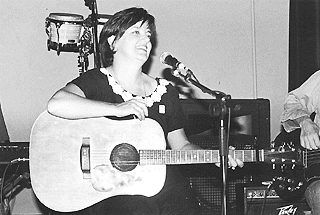Live Shots
Fri., May 29, 1998
|
|
MODEST MOUSE
Emo's, May 17
Talk about your eclectic bills. Califone, a Red Red Meat side project, would have been an eclectic bill all by themselves, what with two drummers, Cold War-era synthesizers, something that looked like the offspring of a banjo and a mandolin, and a sizable cache of guitars. Yet while their set meandered like an afternoon at H.O.R.D.E., Austin's Paul Newman put on a tight, controlled, heads-down show following a funny instrumental set from hirsute heshers Swarming Hordes, whose whole aesthetic could be summed up in three words and an accompanying devil-horns hand gesture: "Dude, metal, dude." This all served as warm-up for Modest Mouse, an eclectic group in their own right. Despite the fact that the Seattle trio's sprawling, caustic sophomore effort, The Lonesome Crowded West, should have been on every critic's Top Ten list from last year, Modest Mouse has been tagged with a reputation for inconsistent live shows. Sunday's show revealed the likely source of said tag: singer/guitarist Isaac Brock, who jumped into the audience looking to fight even before the show started, searching for a yokel who threw a glass of something at a roadie setting up the guitar amps. Depending on your vantage point, Brock is either volatile or petulant, and that's not just limited to stage demeanor. At multiple points during the hour-long set, while bassist Eric Judy and drummer Jeremiah Green held things together with nonchalant, seen-it-all-before expressions, Brock sent already lengthy songs into uncharted territories, sometimes with careful extensions of the song's established patterns, and sometimes with sheer recklessness, shoving fingers under the bridge for tremolo effects, shaking the guitar for extra warble, and screaming into the guitar pickup when the mike just seemed too inconvenient. Brock was sloppy, but not in a crude, untalented way, or even in a punk rock, fuck-it way; he was just ferocious, a mismanaged aggression that culminated in the closing "Tundra/Desert," a relentless noise train threatening to careen off the tracks with each churning section. If it was possible to get shards of glass to emit from guitar amps, this is how it would be done. And although this approach counters the controlled fury they've found in the studio, Modest Mouse shouldn't do it any other way live. Assuming, of course, that they even could. - Phil West
YANNI
Frank Erwin Center, May 18
Going to a Yanni show is a lot like having a really crummy job: The best thing about it is leaving. Which I did, but not before sitting through the Grecian's first set and a good portion of the second, and witnessing a thoroughly offensive display of revoltingly bourgeois sym-phony compositions. There was, like, a giant cartoon thought-balloon hovering over the 30-person orchestra reading, "I wish I hadn't failed out of Julliard." Save for one violinist, sort of a Francine Reid with a fiddle, the entire spectacle was just painful. Even so, just assume for a moment that the Erwin Center was packed with people into that kind of thing - a safe assumption, because it was - and those people still got the butt of it, literally; Yanni's U-shaped fortress of keyboard solitude opened up to the audience, and yet he spent an anti-socially large portion of the time turned toward the orchestra behind him, showing the audience nothing but his backside. The only thing more boring than watching somebody playing the keyboards is watching the back of somebody playing the keyboards (long, flowing locks or no). Maybe some female concert-goers were satisfied looking at Yanni's butt, but it seemed more like the man who has sold more records than Zamfir was taunting his fans with a sort of "thank-you-for-emptying-your-wallets-I will-now-proceed-to-ignore-you-ha-ha" act. I kept thinking, "These people paid $55 to see some guy's back." It kind of reminded me of the last words the Sex Pistols ever said from the stage: "Ever get the feeling you've been cheated?" Yanni? Rotten. - Michael Bertin
HAIR OF THE DOG
Fadó, May 21
For most bands, regular gigs mean familiar faces, well-known digs, and flowing drinks. This last benefit is especially important for Hair of the Dog, as Guinness Stout is clearly the oil that keeps this Celtic machine well lubricated. So it was surprising that the band came across so disorganized at the start of their regular Thursday night slot at Fadó, Austin's somewhat contrived yet enjoyable Irish pub. Some of the onstage chaos was understandable as they wrestled with broken strings and other technical difficulties that plague all bands, regular gig or not. Luckily, they were a lighthearted lot, poking fun at themselves by saying they probably looked like the three stooges as they twiddled knobs and fumbled for unplugged guitar cords (it wouldn't be Irish music if they took themselves too seriously). After a few more brimming pints of the River Liffey's opaque nectar, however, the Dog hit full stride with their bouncy, multi-vocal "Brigham's 14 (Take Her in Your Arms)." The band then flexed its creative muscle by launching into "Take Five," turning Dave Brubeck's jazz standard into a long, crescendo-driven Celtic meltdown. The spark plug violinist led the group on this and other aural adventures, such as the epic "My Wild Irish Rossini," which found the local quartet mixing standard Celtic riffs with the overture from The Barber of Seville. Then there was "If I Were a Rich Man," which, with the Dog's new tongue-in-cheek lyrics, morphed into a drinker's wet dream of having a new liver installed. In traditional bodhran drum-driven reels and jigs, the violinist ripped off triplet runs so hot you could smell the rosin melting. How was this sort of musical talent received? The crowd on Fadó's outside stage area was generally receptive, if a little listless. This light stupor was quickly blown away, however, when the violinist, facilitated by wireless technology, left the stage while playing to traipse through the bar's interior nooks and crannies, finally coming out by the front door and surprising entering patrons. From that moment on it was clear why Hair of the Dog owns the Thursday night slot at Fadó. - David Lynch
ERIC CLAPTON
Alamodome, San Antonio, May 23
Longevity is not a word bandied about much in the post-punk age of electronica, so when a "dinosaur" like Eric Clapton lumbers through an urban metropolis near you - as he's done for the better part of 30 years now - fans best think twice about whether to spend $50-75 on a ticket to the exhibit. The fact that sooner or later giant pre-historic lizards disappear is an obvious argument for going, but sometimes the best bellwether of what's being offered is what's being sold. For instance, when Clapton came through the Frank Erwin Center in 1995, he was in full blues, revival mode - none of the hits - and the show was a real snooze (literally). Out in support of Pilgrim, his first album of new material in nine years, ol' Slowhand's foray into "smooth blues" may be having the same effect on his fans as "smooth jazz" has on jazz classicists, but one thing is certain: Pilgrim feasts on Clapton's most delicious guitar work since before the death of his son at the turn of this decade. While the new album's mix polishes the programmed backing tracks until they're devoid of any and all soul, songs such as "My Father's Eyes" and "Circus" are as good as anything Clapton's written in the last 20 years; and when combined with the guitarist's searing leads, Pilgrim signals yet another creative peak in a career that peaked only this decade with the success of 1992's multi Grammy-pulldown, Unplugged. Opening with "My Father's Eyes," then sliding into the busy-signal riff that pulses through the album's title track, and continuing through 40 minutes of all new material, Clapton not only delivered on the promise of Pilgrim's guitar-work, he rendered the new songs' sonic casting irrelevant; though Clapton employed a 20-piece orchestra, three back-up singers, two keyboardists, and two rhythm guitarists at the Alamodome, only one instrument was heard all night: Clapton's ringing Stratocaster. Whereas the Alamodome's usually appalling acoustics muddle most instruments and almost any nice guitar tones, everything Clapton played this Saturday night rang like a silver spoon on a crystal champagne flute. His playing even served as a reminder why the verse-chorus-verse-chorus-solo blueprint used to hold "solo" sacred; every one of his solos was the work of a master musician. Those first 40 minutes were probably the most exciting. When he next launched into an acoustic set, "Tears in Heaven," "Layla," and "Change the World," he couldn't compete with San Antonio's loud, enthusiastic throng ("Hard to compare with you lot," he remarked). The blues portion followed, slow, meaty versions of chestnuts like "Crossroads," "Cocaine," and "Have You Ever Loved a Woman." When the thundering ragga of "I Shot the Sheriff" and a sexy, impassioned "Wonderful Tonight" finishing the nearly two-hour main set, only one song was really left for the sole encore: "Sunshine of Your Love." Crushing. The work of a dinosaur? Clapton is Godzilla. - Raoul Hernandez
SATELLITES OF RHYTHM
Elephant Room, May 24
A quiet Sunday night with a holiday the next day. Down in the basement, low-lit brick, smoke, and jazz seem a perfect way to pass an evening. Los Satélites del Ritmo, an offshoot of local Latin-jazz group Ta Mére, further the feel of a long weekend by turning the basement into a front porch. While in Ta Mére, these players are capable of instrumental flights to send you spinning into Paco de Lucia paradise; here, they ply a more neighborly sound, like the guitars and the drums have been brought out after a large meal. Duties are shared up front by Christian Fernandez and another singer/guitarist, and their combined knowledge of traditional folk forms and a strong sense of balladry guided most of the set. Though percussive interplay may be the driving force behind Ta Mére, here it's more a pulse: two guys on congas thumping out a propelling but steady beat that eventually fades into a metronomic role. Trumpet player Michel Navedo, also of Ta Mére, alternately blared like a call to arms, wandering across the scales in a boisterous, high-stepping march directly traceable to his New Orleans roots. Though his horn breaks, played over long dual-conga runs, leaned into Latin jazz a number of times, the tunes played seemed more about the stories they told. A limited grasp of Spanish would indicate that the bulk of these songs were about love and war, and while a random cha cha cha (called, appropriately enough, "Cha Cha Cha") had the ability to pull you out of your seat into auto-salsa mode, this being porch music, all you really needed to do was sit back, close your eyes, and sing along. - Christopher Hess







